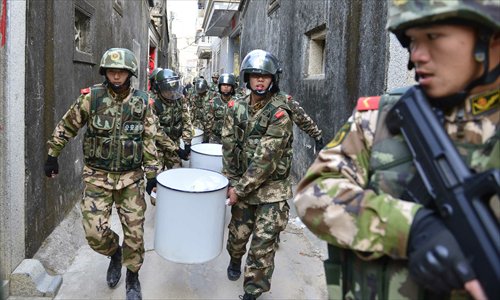HOME >> CHINA
Drug village busted in Guangdong
By Chang Meng Source:Global Times Published: 2014-1-4 0:43:01

Paramilitary policemen carry buckets of crystal meth they seized during a raid on drug labs in Boshe village, Shanwei city, Guangdong Province, on December 29. Photo: IC
More than 3,000 police officers in South China's Guangdong Province busted 18 drug cartels overnight in Shanwei, a key base of meth manufacturing and trafficking, marking the biggest ever triumph for anti-drug operations in the province, Guangdong police announced on Thursday.
The village of Boshe, part of the administrative region of the city of Lufeng, was surrounded by police, helicopters and speedboats in the small hours on December 29, followed by the climax of a major drug enforcement campaign. The "drug village" was toppled in a few hours after more than two months of preparation and attracted nationwide attention Friday.
The blitz, which focused on Shanwei and took place simultaneously in several other cities in Guangdong as well as some places in Chongqing and Fujian Province, arrested 182 suspects and confiscated 2,925 kilograms of meth and 260 kilograms of ketamine, along with over 100 tons of raw materials.
Lufeng, a major center of drugs, sits by the South China Sea. The region's dealers cooked more than one third of meth trafficked around the country in the past three years.
More than 20 percent of the 1,700 households in Boshe village participated in the "business," making it the biggest drug center in Lufeng, said Qiu Wei, political commissar of the Narcotics Control Bureau of the Guangdong Provincial Public Security Department.
Several key suspects, including Cai Lianghuo, allegedly the founder of the local drug industry, and Cai Zhaorong, an important trafficker who allegedly controls the meth market in several provinces, were arrested during the crackdown, according to police.
The utmost target, however, was Cai Dongjia, the village's Party chief, whom police accused of providing a protective umbrella for the cartel. He was also arrested.
Drug dealing in Boshe had developed into a family-run industry with protection from local officials and law enforcement, and informers to watch the vital traffic arteries. The criminals were equipped with illegal guns, crossbows or even bombs, and had violently attacked on the police at least twice during previous crackdowns, according to police.
"Boshe is a warning for many drug dealers to assess the risks of their business. The successful crackdown saw a number of big names and protection arrested, which sets a milestone for narcotics control in Guangdong, and even around the country," Guo Shaobo, deputy director of the Guangdong Provincial Public Security Department, was quoted by the Guangzhou-based Nanfang Daily as saying, adding that further crackdowns will follow.
China solved 122,000 drug-related cases in 2012 and captured 133,000 suspects, a nearly 20 percent increase year-on-year, according to a report by the National Narcotics Control Commission.
Over 23 percent of criminals convicted of drug offences from January to May in 2013 were sentenced to above five years in prison, life imprisonment or the death penalty, said Sun Jungong, spokesman of the Supreme People's Court.
Despite strengthened police campaigns and severe punishments, drug-related crimes are still rampant as dealers now have more diverse ways to manufacture drugs, especially meth. For instance, they extract ephedrine out of ephedra, a medical herb, to make meth.
Several ephedra sellers reached by the Global Times said that ephedra is cheap, but the trade is under strict control by the authorities.
"The quickly evolving and relatively new drugs such as meth are a huge challenge for narcotic control, as relevant legislation and supervision are always lagging compared to the knowing of dealers and addicts," said Liu Sa, an expert with the Beijing Education Base of Forbidding Narcotics and Hallucinogens, a government-funded group.
Drug trafficking through the Internet and courier companies also made it harder to track suspects as dealers can easily hide their identity and disguise the contents from couriers.
Although "prevention" is a major principle of China's narcotics control work, Liu noted that a lack of participation of social groups and enterprises, and the shortage of professional education staff remain big challenges, as the general public still consider drugs a distant issue.
Posted in: Society